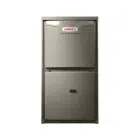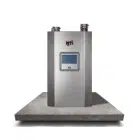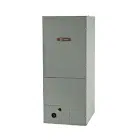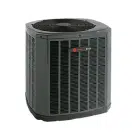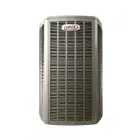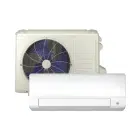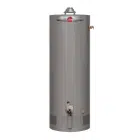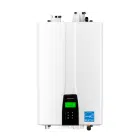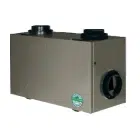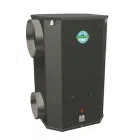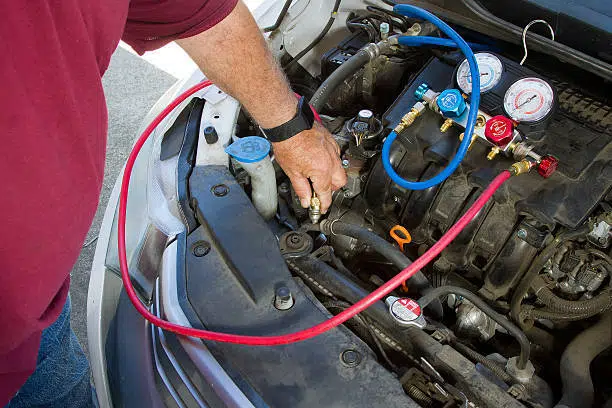
Table of Contents
- Factors Influencing Air Conditioner Repair Costs
- Average Air Conditioner Repair Costs in Canada (2024)
- Signs Your Air Conditioner Needs Repair
- DIY Troubleshooting vs. Professional Repair
- Tips for Reducing Air Conditioner Repair Costs
- When to Consider Replacement Instead of Repair
- How to Choose the Right HVAC Service Provider
- Conclusion
- FAQ
As we move into 2024, many homeowners in Canada are preparing for the next wave of summer heat. When your air conditioning system starts acting up, the first thing that likely comes to mind is: “How much is this going to cost me?” Understanding air conditioning repair costs can help you plan better and avoid unnecessary stress. In this guide, we’ll walk you through everything you need to know about air conditioner repair costs in Canada for 2024, from what factors influence the price to when it might be time to consider a replacement instead of a repair.
Factors Influencing Air Conditioner Repair Costs
Air conditioning repair costs can vary widely, and several factors come into play. Let’s break down the key elements that determine what you might end up paying.
Type of Air Conditioner
The kind of air conditioning system you have will significantly impact repair costs. Central air conditioning systems, which cool entire homes through a network of ducts, tend to be more expensive to repair due to their complexity. Ductless mini-split systems, which are often used in smaller homes or individual rooms, generally have lower repair costs. Window units and portable air conditioners usually fall on the cheaper end, but they’re also less common in Canadian homes.
Nature of the Problem
Not all air conditioning issues are created equal. A simple thermostat replacement might only set you back $100 to $200, while fixing a refrigerant leak could cost upwards of $500. If your compressor—the heart of your air conditioning system—fails, you’re looking at a much bigger expense, often between $1,200 and $2,500, depending on the model and whether the warranty covers parts.
Age of the Unit
The age of your air conditioning unit plays a big role in repair costs. Older units may require parts that are hard to find or no longer in production, driving up the cost. Moreover, older systems are often less efficient, meaning that even after a repair, they might not perform as well as newer models.
Seasonality
Timing can also influence costs. During peak summer months, HVAC companies are busier, which can lead to higher labor costs. On the other hand, if you’re proactive and get repairs done during the off-season, you might find more competitive pricing.
Location in Canada
Where you live can affect repair costs, too. Urban areas like Toronto, Vancouver, and Montreal often have higher labor rates than rural areas. Additionally, certain provinces may have different regulations or energy standards that can impact the overall cost of air conditioning repair services.
Availability of Parts
The availability of parts is another crucial factor. If your air conditioning system uses a specific type of refrigerant that’s being phased out, like R-22, the cost of recharging your system can be quite high. On the other hand, newer units that use more common refrigerants like R-410A might be cheaper to repair.
Warranty Coverage
Finally, warranty coverage can significantly offset repair costs. If your air conditioning unit is still under warranty, you might only need to cover the labor costs, which could save you hundreds of dollars. Always check your warranty before proceeding with any major repairs.
Average Air Conditioner Repair Costs in Canada (2024)

Now that we’ve covered the factors that affect air conditioning repair costs, let’s look at the actual numbers. Below is a table that outlines the average cost range for various common air conditioning repairs in Canada for 2024.
Regional Cost Variations
To give you a more detailed perspective, here’s how these costs might vary across different regions in Canada:
- Toronto and GTA: Air conditioning repair costs in the Greater Toronto Area are generally on the higher end of the spectrum due to higher labor rates and demand.
- Vancouver: Similar to Toronto, Vancouver’s pricing can be steep, particularly during the summer months.
- Montreal: Costs here are slightly lower on average, but still comparable to other major cities.
- Calgary and Edmonton: Alberta tends to have more moderate pricing, especially in less densely populated areas.
- Rural Areas: Expect lower labor costs but possibly higher parts costs if special ordering is required.
Check out our previous article to find out how much it costs to buy a new air conditioner in our home AC buying guide.
https://thehvacservice.ca/home-air-conditioners-the-2024-buyers-guide/
Signs Your Air Conditioner Needs Repair
Catching air conditioning issues early can save you from a bigger bill down the road. Here are some signs to watch out for that indicate your AC might need repair.
Performance Issues
If your air conditioning unit isn’t cooling your home as efficiently as it used to, or if it’s struggling to maintain a consistent temperature, there might be an underlying problem. Reduced airflow or warm air coming from the vents can signal that your unit is in trouble.
Increased Energy Bills
An unexplained spike in your energy bills is another red flag. If your air conditioning unit is working harder than it should to cool your home, it’s using more energy, which directly affects your utility bills.
Unusual Noises
Air conditioning systems aren’t exactly quiet, but if you start hearing new noises—like banging, grinding, or hissing—it’s time to call in a professional. These sounds often indicate mechanical issues that need immediate attention.
Unusual Odors
If your air conditioning unit starts emitting strange odors, this could be a sign of mold growth or even a burnt-out wire. Either way, it’s an issue that should be checked out right away to avoid further damage.
Leakages
Any water or refrigerant leakage around your air conditioning system is a cause for concern. While water leaks might just mean a blocked drain tube, refrigerant leaks are more serious and can be costly to repair.
Reach out to HVAC Service Solutions with any kind of AC repair problems mentioned below. We will be happy to help you and bring you back a piece of mind.
DIY Troubleshooting vs. Professional Repair
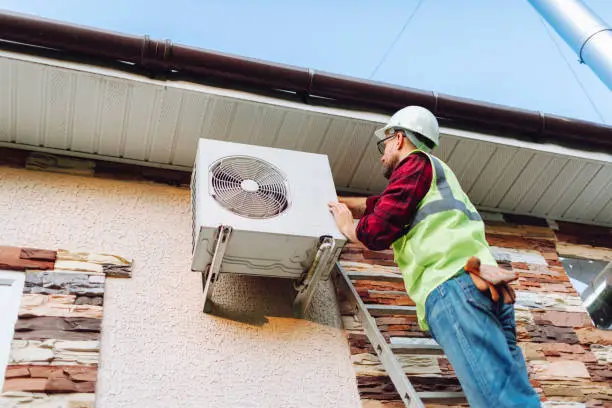
It’s tempting to try and fix things yourself, especially with all the DIY guides available online. However, when it comes to air conditioning, it’s important to know when a problem is something you can handle and when it’s time to call in the pros.
When You Can Fix It Yourself
Simple issues like a clogged air filter or a tripped breaker can often be resolved without professional help. Regularly cleaning or replacing your air filter is something every homeowner should do to maintain the efficiency of their system. Resetting a tripped breaker is also straightforward, but if it keeps happening, there might be a deeper electrical issue at play.
When to Call a Professional
For more complex issues—like refrigerant leaks, electrical problems, or anything involving the compressor—it’s best to leave it to the experts. These components are delicate, and mishandling them can not only worsen the problem but also pose safety risks.
Risks of DIY Repairs
Attempting a DIY fix on something like a refrigerant leak can be dangerous. Refrigerants are chemicals that need to be handled with care, and improper handling can lead to serious health risks. Additionally, if you accidentally damage your unit while attempting a repair, you could end up voiding your warranty.
Tips for Reducing Air Conditioner Repair Costs
Nobody likes unexpected air conditioning repair bills, but there are ways to minimize the cost and frequency of repairs.
Regular Maintenance
The best way to avoid costly repairs is through regular air conditioner maintenance. This includes annual inspections by a professional, during which they can check for potential issues before they become serious problems. Simple tasks like cleaning the coils, checking refrigerant levels, and tightening electrical connections can go a long way in keeping your air conditioning running smoothly.
Energy Efficiency Improvements
Upgrading your home’s insulation or sealing ductwork can improve the overall efficiency of your air conditioning, reducing the strain on the system. A system that doesn’t have to work as hard to cool your home is less likely to break down and will generally have lower operating costs.
Warranty and Insurance
Always check if your air conditioning unit’s warranty is still valid before paying out-of-pocket for repairs. Some home insurance policies also cover certain types of air conditioning damage, so it’s worth reviewing your policy to see what’s included.
When to Consider Replacement Instead of Repair
Sometimes, repairing your air conditioning unit isn’t the most cost-effective option, especially if the unit is old or the repairs are extensive. Here’s how to decide whether it’s time to repair or replace.
Cost vs. Benefit Analysis
A good rule of thumb is the 50% rule: if the cost of repairs is more than 50% of the cost of a new unit, it’s probably time to replace the system. Newer air conditioning models are also likely to be more energy-efficient, which can save you money in the long run.
Efficiency Considerations
Older air conditioning units tend to be less efficient, which means they cost more to run. If your current unit is more than 10-15 years old, replacing it with a modern, energy-efficient model could lower your energy bills significantly and reduce the need for repairs.
Environmental Impact
Newer air conditioning units are not only more efficient but also more environmentally friendly. They use refrigerants that are less harmful to the environment and are designed to operate more efficiently, reducing your carbon footprint.
How to Choose the Right HVAC Service Provider
When it comes to getting your air conditioning repaired, choosing the right service provider is crucial. Here’s what to look for.
- Make sure the HVAC company you choose is licensed and insured. Experience matters too; look for a company with a solid track record and positive customer reviews. Transparency is also important—make sure they provide clear, written estimates before any work begins.
When the technician arrives, don’t hesitate to ask questions. Ask for an explanation of the issue, the cost breakdown, and the expected lifespan of the repair. It’s also a good idea to ask for maintenance tips to prevent future issues.
- A reputable HVAC company will prioritize customer service and professionalism. They should arrive on time, be courteous, and respect your home by cleaning up after themselves. Good communication is key, so choose a company that listens to your concerns and provides clear, honest answers.
Conclusion
Replacing your furnace in Ontario is a crucial investment in your home’s comfort and energy efficiency. While the cost can vary depending on several factors, understanding these elements helps you make a more informed decision. From the type of furnace to the size of your home, energy efficiency, and the quality of installation services, every detail matters when it comes to managing your furnace replacement cost.
By choosing a reputable provider like HVAC Service Solutions, you ensure that your furnace replacement is handled with the care and expertise it deserves. Not only will you enjoy a warmer home, but you’ll also benefit from lower energy bills and the peace of mind that comes from knowing your investment is protected.
If you’re considering furnace replacement, don’t hesitate to contact us for a free consultation. Let us help you find the perfect solution for your home and budget, so you can enjoy a cozy, comfortable winter in Ontario.
Frequent Asked Questions
How do I know if my air conditioner needs a repair or just regular maintenance?
If your air conditioner is struggling to maintain the desired temperature, making unusual noises, or causing an increase in your energy bills, it likely needs a repair. Regular maintenance typically involves cleaning or replacing the air filter, checking refrigerant levels, and ensuring all components are functioning properly. If you’ve been keeping up with routine maintenance and still notice issues, it’s a sign that something more serious might be wrong. In such cases, it’s best to have a professional diagnose the problem to determine whether it requires a repair or if maintenance will suffice.
Is it worth repairing an older air conditioner, or should I replace it?
This depends on the age of your unit and the extent of the repairs needed. Generally, if your air conditioner is over 10-15 years old and the repair costs are approaching 50% of the cost of a new unit, replacement might be the better option. Older units tend to be less energy-efficient, meaning they cost more to operate. Additionally, newer models come with advanced features and better environmental standards. However, if the repair is minor and your unit is still in good condition, repairing it could be a cost-effective solution.
What’s the typical turnaround time for air conditioner repairs?
The turnaround time for air conditioner repairs can vary based on the nature of the problem and the availability of parts. Minor repairs, such as replacing a capacitor or fixing a wiring issue, can often be completed in a few hours. More complex repairs, like fixing a refrigerant leak or replacing a compressor, might take a day or two, especially if parts need to be ordered. During peak seasons, when HVAC companies are busy, you might experience longer wait times, so it’s a good idea to address any issues as soon as you notice them.
How can I extend the lifespan of my air conditioner?
Regular maintenance is the key to extending the lifespan of your air conditioner. This includes changing or cleaning the air filters every 1-3 months, keeping the outdoor unit clear of debris, and scheduling annual professional inspections. During these inspections, technicians can catch small issues before they become major problems. Additionally, using your air conditioner efficiently—such as setting a reasonable temperature, using a programmable thermostat, and ensuring your home is properly insulated—can reduce strain on the system and help it last longer.
Are air conditioner repair costs covered by home insurance?
Home insurance typically does not cover air conditioner repairs unless the damage was caused by a covered peril, such as a storm or fire. Standard wear and tear, or issues arising from a lack of maintenance, are generally not covered. However, some home warranty plans do cover HVAC systems, so it’s worth checking if you have such coverage. Always review your insurance policy or speak with your provider to understand what is and isn’t covered in case of air conditioner repairs.
What should I do if my air conditioner is leaking water?
If your air conditioner is leaking water, it’s usually a sign of a clogged condensate drain line, a frozen evaporator coil, or improper installation. Start by turning off the unit to prevent further damage. If you’re comfortable doing so, check the condensate drain line for blockages and clear any debris. If the issue persists or if you notice ice on the coils, it’s best to call a professional. Ignoring water leaks can lead to more significant problems, including water damage to your home and mold growth.
How can I improve my air conditioner’s energy efficiency?
Improving your air conditioner’s energy efficiency starts with regular maintenance. Clean or replace air filters frequently, as clogged filters can restrict airflow and force the unit to work harder. Additionally, ensure your home is well-insulated and seal any leaks in doors and windows to prevent cool air from escaping. Installing a programmable thermostat can also help, allowing you to set your air conditioner to run only when needed. Finally, consider upgrading to a high-efficiency model if your current unit is older and less efficient.
What are the most common air conditioner repairs, and how much do they cost?
Some of the most common air conditioner repairs include replacing capacitors, fixing refrigerant leaks, and repairing fan motors. Capacitor replacements typically cost between $150 and $400, while refrigerant leak repairs can range from $400 to $800, depending on the severity of the leak and the type of refrigerant used. Fan motor repairs generally cost between $300 and $600. Electrical issues, such as faulty wiring or circuit board repairs, can cost anywhere from $150 to $800, depending on the complexity of the problem.
How often should I have my air conditioner serviced?
It’s recommended to have your air conditioner professionally serviced once a year, ideally in the spring before the heavy use of summer begins. During this service, a technician will inspect all components, check refrigerant levels, clean coils, and perform any necessary tune-ups to ensure the system runs efficiently. Regular servicing can help catch small issues before they become major problems, prolong the life of your unit, and maintain its efficiency, ultimately saving you money on energy bills and potential repairs.
What should I expect during a professional air conditioner repair service?
During a professional air conditioner repair service, the technician will first diagnose the problem by inspecting the unit and asking about any issues you’ve noticed. They’ll check key components such as the compressor, refrigerant levels, electrical connections, and air filters. Once they identify the problem, they’ll explain the issue, provide a cost estimate for the repair, and discuss any other concerns they may have found. After you agree to the repair, they’ll proceed with fixing the issue. Once the repair is complete, they should test the system to ensure it’s running properly and provide you with any necessary maintenance tips.
Share

